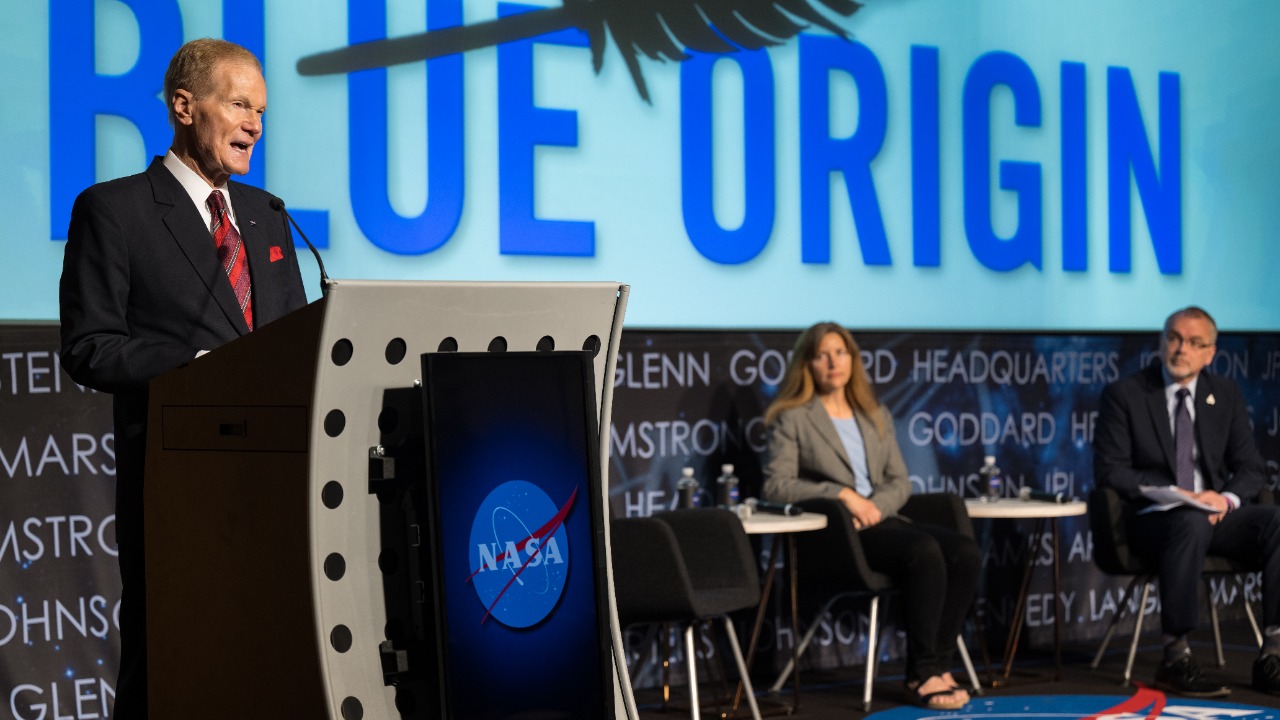
Blue Origin, the spaceflight company founded by Jeff Bezos, is gearing up to launch its New Glenn rocket for NASA’s first contracted mission, the ESCAPADE spacecraft pair. This mission, aimed at studying Mars’ magnetosphere, signifies Blue Origin’s entry into crewed and scientific spaceflight partnerships with NASA. However, the much-anticipated launch was postponed due to last-minute technical issues, adding a dramatic twist to this historic event.
Blue Origin’s New Glenn Rocket
The New Glenn rocket, a product of Bezos’s Blue Origin, is the company’s first orbital-class launch vehicle designed for reusable missions to low Earth orbit and beyond. This heavy-lift vehicle has been in development for years, and its debut mission is a testament to Blue Origin’s commitment to sustainable space access. The New Glenn is set to carry NASA’s ESCAPADE mission payloads, demonstrating its capability for interplanetary transport. This aligns with Bezos’s vision when he founded Blue Origin in 2000, focusing on space tourism and exploration.
NASA’s ESCAPADE Mission Overview
NASA’s ESCAPADE mission involves two identical small spacecraft, named Blue and Gold, which will be launched together to orbit Mars and investigate its magnetosphere. The mission, officially known as Escaping and Scattered Particle Analysis Detector, aims to measure how solar wind interacts with Mars’ atmosphere. This will provide valuable data on planetary escape processes, contributing to our understanding of Mars and its potential for future exploration. This mission is Blue Origin’s first official launch contract with NASA, marking a shift toward commercial providers for Mars science missions.
Launch Preparation and Timeline
The inaugural flight of the New Glenn rocket for the ESCAPADE mission was initially scheduled for November 9, 2025, from Cape Canaveral Space Force Station in Florida. Pre-launch activities included the final integration of the ESCAPADE spacecraft onto the rocket at Blue Origin’s production facility in Florida. After launch, the mission timeline involves a six-month cruise to Mars, with orbital insertion planned for mid-2026 to begin scientific operations. This ambitious timeline underscores the importance of this mission in advancing our understanding of Mars.
The Launch Scrub Incident
However, the November 9, 2025, launch of NASA’s ESCAPADE mission was scrubbed due to an unspecified technical anomaly detected during the final countdown. The decision to stand down and reschedule the launch was made late in the evening, underscoring the commitment of both NASA and Blue Origin to mission safety. Thankfully, no injuries or major damage were reported. Engineers from both organizations are now reviewing data to ensure mission safety before attempting another launch.
How to Watch the Launch
For those interested in witnessing this historic event, the New Glenn launch can be streamed live on Blue Origin’s official website and YouTube channel. Coverage typically starts about two hours before liftoff. Additionally, NASA will provide live commentary through its TV channel and app, focusing on the scientific goals of the ESCAPADE mission during the broadcast. The launch window for the rescheduled attempt opens on November 10, 2025, at 19:30 UTC, weather permitting, from Launch Complex 36 at Cape Canaveral. This information and more can be found on USA Today’s coverage of the event.
Significance of the Partnership
This collaboration between NASA and Blue Origin is significant, marking Bezos’s company as a key player in NASA’s commercial launch ecosystem. This places Blue Origin in direct competition with SpaceX for Mars-related contracts. The success of the ESCAPADE mission could pave the way for future Blue Origin involvement in NASA’s Artemis program and deeper space exploration. By awarding the launch to Blue Origin, NASA is diversifying its providers, reducing reliance on single entities for critical missions to Mars. This strategic move signifies a new era in space exploration, where commercial providers play an increasingly important role in advancing our understanding of the universe.
More from MorningOverview